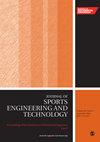Does the operating temperature of accelerometers affect data measurement during static and dynamic conditions in sports? A randomized-control trial
IF 1.1
4区 医学
Q4 ENGINEERING, MECHANICAL
Proceedings of the Institution of Mechanical Engineers, Part P: Journal of Sports Engineering and Technology
Pub Date : 2023-05-17
DOI:10.1177/17543371231175545
引用次数: 0
Abstract
This study aimed to analyse the effect of two operating temperatures (optimal vs environmental) on IMU internal temperature and accelerometry-based data in two conditions of measurement: (a) static, no movement; and (b) dynamic, a U’16 game-based training soccer session with 14 players. Each session took a 60-min duration and followed an ecological design (no intervention in environmental conditions). Fifty-six WIMU PROTM inertial devices were randomly grouped in four conditions (two operating temperatures × two measurement conditions, 14 devices in each group) and recorded IMUs’ internal temperature, resultant acceleration vector and PlayerLoad (PLRT). Devices were placed in the manufacturer’s docking station at the static condition and in a specific harness at the interscapular level at the dynamic condition. Repeated measures t-tests were employed for between-group comparisons at 1-min average sections throughout the register. Between-group differences were found in the static and dynamic conditions in IMUs internal temperature (static: 0–31 min; dynamic: 0–20 min) and resultant acceleration vector (static: 0–29 min; dynamic: 0–19 min). Instead, no differences were found in PLRT dynamics and accumulated PLRT although values in the environmental group were overestimated. In conclusion, WIMU PROTM devices must achieve the optimal operating temperature (38–39°) to avoid measurement error, regardless of the application (short or long sessions).加速度计的工作温度是否会影响运动中静态和动态条件下的数据测量?随机对照试验
本研究旨在分析两种工作温度(最佳温度和环境温度)在两种测量条件下对IMU内部温度和加速度测量数据的影响:(a)静态,无运动;和(b)动态,一个u16比赛为基础的训练足球课程,有14名球员。每个环节持续60分钟,并遵循生态设计(不干预环境条件)。将56个WIMU PROTM惯性器件随机分组在4种工况下(2种工作温度× 2种测量工况,每组14个),记录imu内部温度、由此产生的加速度矢量和PlayerLoad (PLRT)。在静态条件下,设备被放置在制造商的对接台上,在动态条件下,设备被放置在肩胛骨间水平的特定线束上。采用重复测量t检验在整个登记区的1分钟平均切片进行组间比较。静、动态条件下imu内部温度组间差异(静态:0 ~ 31 min;动态:0-20分钟)和合成加速度矢量(静态:0-29分钟;动态:0-19分钟)。相反,在PLRT动态和累积PLRT方面没有发现差异,尽管环境组的值被高估了。总之,WIMU PROTM器件必须达到最佳工作温度(38-39°),以避免测量误差,无论应用(短时间或长时间)。
本文章由计算机程序翻译,如有差异,请以英文原文为准。
求助全文
约1分钟内获得全文
求助全文
来源期刊

Proceedings of the Institution of Mechanical Engineers, Part P: Journal of Sports Engineering and Technology
ENGINEERING, MECHANICAL-SPORT SCIENCES
CiteScore
3.50
自引率
20.00%
发文量
51
审稿时长
>12 weeks
期刊介绍:
The Journal of Sports Engineering and Technology covers the development of novel sports apparel, footwear, and equipment; and the materials, instrumentation, and processes that make advances in sports possible.
 求助内容:
求助内容: 应助结果提醒方式:
应助结果提醒方式:


